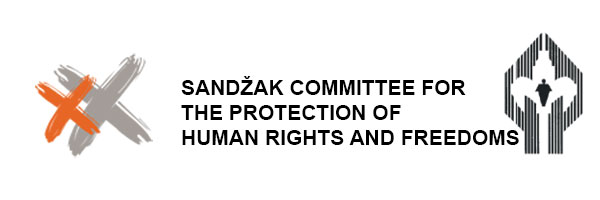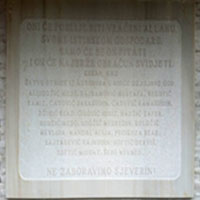Sjeverin: 24 years of search for truth, justice and recognition
 On Saturday, 22 October, it will be twenty-four years since 16 Serbian citizens of Bosniak ethnicity from Sjeverin, near Priboj, were kidnapped and subsequently killed by members of Bosnian Serb forces during the armed conflict in Bosnia and Herzegovina (BiH). On this occasion, the Humanitarian Law Center (HLC) and the Sandžak Committee for Protection of Human Rights and Freedoms reiterate that after so many years of search the mortal remains of the victims have not yet been found, while the Serbian institutions persistently refuse to provide the victims with reparation, support and recognition.
On Saturday, 22 October, it will be twenty-four years since 16 Serbian citizens of Bosniak ethnicity from Sjeverin, near Priboj, were kidnapped and subsequently killed by members of Bosnian Serb forces during the armed conflict in Bosnia and Herzegovina (BiH). On this occasion, the Humanitarian Law Center (HLC) and the Sandžak Committee for Protection of Human Rights and Freedoms reiterate that after so many years of search the mortal remains of the victims have not yet been found, while the Serbian institutions persistently refuse to provide the victims with reparation, support and recognition.
On 22 October 1992, members of the paramilitary unit “Osvetnici” (Avengers), which operated under the auspices of the Army of Republika Srpska (VRS), stopped a bus of the “Raketa” bus company from Užice travelling on its regular route Priboj–Rudo–Priboj, near the bridge over the Lim River in the village of Mioče (BiH). Having checked the identity of all the passengers, the unit members took off the bus the passengers of Bosniak nationality only, namely, Mehmed Šebo, Zafer Hadžić, Medo Hodžić, Medredin Hodžić, Ramiz Begović, Derviš Softić, Mithad Softić, Mujo Alihodžić, Alija Mandal, Sead Pecikoza, Mustafa Bajramović, Hajrudin Sajtarević, Esad Džihić, Idriz Gibović, Ramahudin Ćatović and Mevlida Koldžić, and transported them in a military truck to Višegrad, where they brutally abused and eventually killed them. The night before, members of the same unit kidnapped Sabahudin Ćatović in front of his home in Sjeverin and took him to an unknown destination.
The District Court in Belgrade qualified the kidnapping and murders as a war crime against a civilian population, and in 2005 finally sentenced members of the “Osvetnici” unit Milan Lukić, Oliver Krsmanović, and Dragutin Dragićević to 20 years’ imprisonment, and Đorđe Šević to 15 years’. Since the conclusion of the criminal proceedings, Serbian institutions have turned down all claims filed by the victims’ family members for reparation and other rights and benefits they are entitled to under the Constitution and relevant law. The only positive step was taken by the Municipality of Priboj, which provided assistance in the building of the memorial dedicated to the victims which was unveiled in October 2015, and also attended the events commemorating this crime.
The families of the killed residents of Sjeverin attempted, without success, to obtain compensation for the murder of their next of kin by suing the Republic of Serbia in 2007, claiming that the
Republic of Serbia should be held responsible for providing support to the VRS and failing to prevent the crime and fulfil its duty to protect its citizens in this border area during the armed conflict in neighbouring BiH. The proceedings dragged on for more than six years before the lawsuit was rejected. The case is now being dealt with by the European Court of Human Rights. The Serbian courts refused to take into consideration the close links that existed then between the leaderships of Serbia and Republika Srpska, and did not find the state of Serbia accountable for failing to secure its state border, its people and property located in the vicinity of the war-affected area, although this was, according to regulations in effect at the time, the duty of the Serbian military and internal affairs authorities.
Applications for monthly cash benefits, which some family members of the victims filed under the Law on the Rights of Civilian Invalids of War, were also rejected. The reason given was identical in all of the cases – the Law does not cover those cases where loss of life occurred outside the territory of the Republic of Serbia – despite the fact that the Law itself does not explicitly stipulate this, and that in some similar cases the applications were approved. The recent granting of the constitutional appeal lodged by Rasim Pecikoza, the father of kidnapped Sead Pecikoza, is indicative of a possible shift in attitude towards awarding the status of civilian victims of war and, with it, the corresponding monthly benefits, to the victims from Sjeverin. The Constitutional Court invoked the opinion held by the Supreme Court of Serbia in deciding similar cases, namely, that the acquisition of the rights provided for in the Law does not depend on the place where loss of life or injury occurred. Having found that different interpretations of the provisions of the Law led to violations of the right to a fair trial, the Constitutional Court quashed the decision previously handed down in this case and referred the case back to the Administrative Court for reconsideration.
In addition to seeking adequate reparation for their suffering, the families of the victims from Sjeverin are still in search of the mortal remains of the killed. Over the past 24 years only one body has been found, that of Medredin Hodžić, in Lake Perućac, in 2010. And the families of other victims still feel utterly hopeless because of not being able to recover the bodies of their loved ones, give them a proper burial and mark their graves.
The years-long failed attempts of the families of the victims to achieve their right to reparation leave no doubt that state institutions tend to avoid having to admit that Serbia is to be held responsible for failing to take any action to prevent the kidnapping and murder of Sjeverin residents. And the unsuccessful search for the bodies of the killed reveals that there is a code of silence around this crime, which prevents any attempt at uncovering the truth stored in the archives of state institutions. Some positive steps that clearly have been made, such as the engagement of a local government in commemoration events for the victims or the latest ruling of the Constitutional Court, which may put an end to arbitrary interpretations of the Law, offer cold
comfort to the families who for have been waiting for more than two decades for truth, justice and recognition. Consequently, the HLC and the Sandžak Committee for Protection of Human Rights and Freedoms consider that responsibility for providing full rehabilitation and reparation to the victims lies entirely with the Serbian institutions, and therefore require them to demonstrate, in the Sjeverin case, their determination to stop avoiding responsibility for human rights violations that took place in the 1990s and provide the long-awaited satisfaction to the victims.







